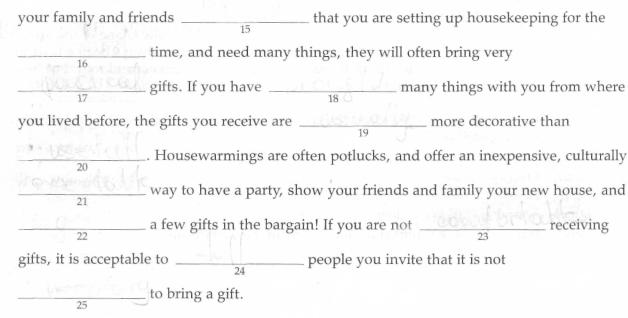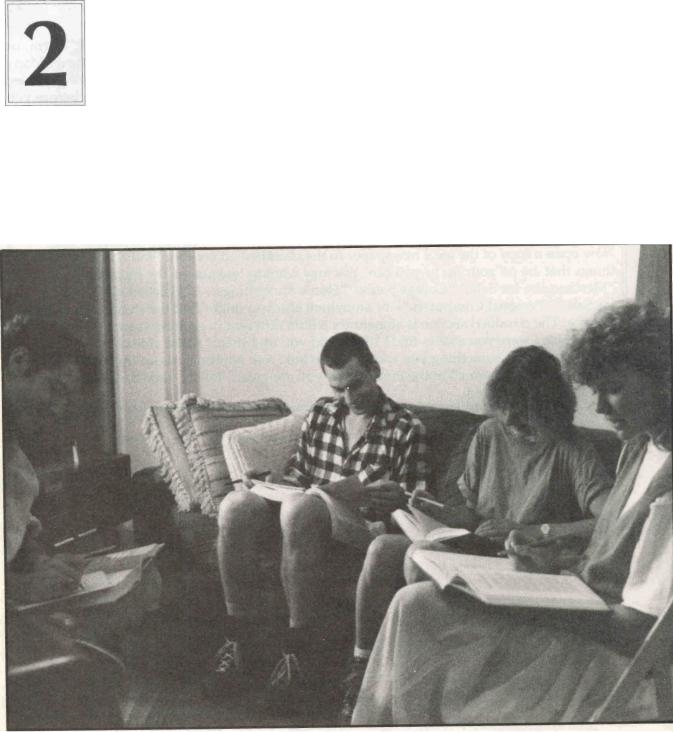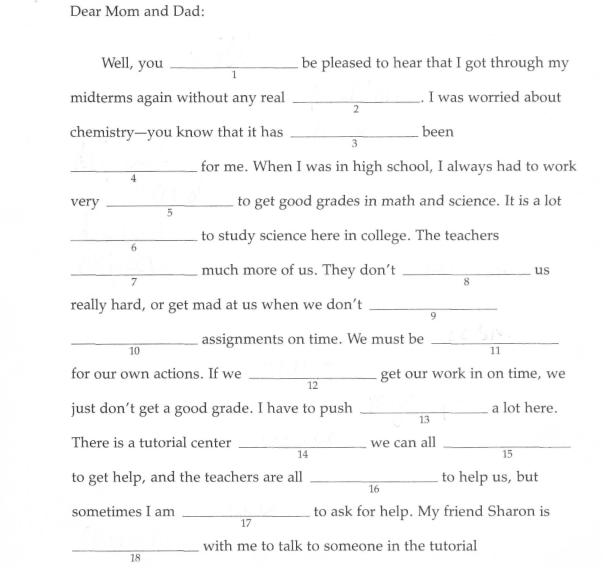
on_a_roll
.pdf
The Potluck
Final Project
There are many places where you can buy things that you need for your house, dorm, or apartment. In the United States, it is very common to buy things that are not new. Many times you can find what you need at garage sales or at flea markets. If you are buying dishes, silverware, pans, linens, or furniture, it is easy to see what condition they are in before you buy them. If you are buying small electrical appliances, the seller will usually let you plug them in somewhere to check them out and make sure that they work. It's fun to shop at garage sales and flea markets where you can find good bargains—it's also a lot cheaper than buying everything new.
Invent a "wish list" of all of the things you would like to buy for your room, apartment, or house if you had a lot of money. Perhaps you would like to have a king-sized heated water bed, a food processor, a rocking chair, or a new stereo. Write everything down.
Now open a copy of the local newspaper to the classified ad section. Find as many of the things that are on your list as you can. You may want to look under the headings "Merchandise for Sale," "Garage Sales," "Home Furnishings," "Collectables," "Articles for Sale," "Personal Computers"—or anywhere else you might find the things you want to have. The classified section is sometimes a little different in each newspaper. How many things were you able to find? Where did you find them? Make at least two phone calls to check out something you would like to buy. Ask questions about the item listed in the paper. Write down all of the information you are given. Talk to your classmates about what you have learned.
The Potluck |
11 |

After Class
General Warm-Up Questions
Read the following questions before you begin. They will help you to focus on the topic covered in this chapter.
Do you like classes that meet for two or three hours at a time? What do you think is the perfect length of time for a class period? Is it different with different subjects? A break during a class gives you some time to relax and talk to friends, but it also sometimes stops your con centration. Some people think that it's better not to take breaks during a class. Do you agree? How often should you have breaks?
When you know that you are going to have a test, how do you study? Do you study a little bit all term, or do you wait and do all of your studying at the last minute? What do you think is the best way to prepare for a test? Some teachers like to give surprise tests. You don't have time to prepare, but you also don't have time to worry. Are surprise tests a good idea? What was the most difficult subject you have studied? What subject is the easiest for you?
Prelistening/Reading Study Questions
Read the following questions before you listen to or read the dialogue. Take a few moments to think about them. They will help you understand the dialogue when you begin.
What kind of test did Fred have? What does his psychology instructor do? What time is he supposed to get out of class? Sharon gives Fred some advice. What does she think he should do? What class does Fred have right after psychology? If the teacher doesn't see Fred putting on his jacket, what does Sharon think he should do? Do you know what grade Fred got on his midterm?
Vocabulary
TO HOLD ON: to wait for someone; to slow down or pause for a moment
A SEC: a second; a very short period of time (This expression is common in fast, casual speech. When you are writing, it should always be written as a second.)
D'YA: do you (This is common in fast, casual speech. When you are writing, these words should always be written as do you.)
TO KEEP UP (WITH THE JONESES): to continue; to go at the same speed as others
YA: you (Note that the pronunciation is the same as it is for yeah. This pronunciation is com mon in fast, casual speech. When you are writing, it should always be written as you.)
MIDTERM: a test (examination) that is usually given in the middle of the semester or quar ter
Έ Μ : them (This expression is common in fast, casual speech. When you are writing, it should be written as them.)
PRETTY SURE: reasonably certain of something
After Class |
13 |
WANNA: want to (This expression is common in fast, casual speech. When you are writing, it should be written as want to.)
TO ACE: (a test or a course): to do very well; to get an excellent grade (from the highest card in a deck—the ace)
TEN TO: ten minutes before the hour
TO BE ON A ROLL: to have things going smoothly; to build up momentum; to be moving physically or mentally
PSYCH: abbreviation for psychology; the science of mind and behavior
TO GET SOMEWHERE: to accomplish something, to be successful
TO GRIPE: to express pain, unhappiness, or displeasure
POLITE: courteous, well-mannered, considerate to others
BACK-TO-BACK: to have more than one thing to do with little or no time in between
TO PACK UP: to put things away; to get ready to go
DENSE: thick, solid; crowded (population); slow to understand (a person)
TO STARE: to look at steadily without looking away
TO CATCH ON: to understand what's happening, to comprehend suddenly
TO SHIFT AROUND: to change positions; not to sit still in your seat
TO GIVE SOMETHING A TRY: to try something; to make an attempt at a job, a lesson, and so on
BRAINSTORM: a very good idea; usually an idea that comes like a storm—without warning or time to prepare for it
AFTER CLASS
Sharon Hey, Fred, hold on a sec! Are you headed for class?
Fred Yeah. I have psych at 10.
Sharon D'ya like it?
Fred It's not bad, but there's a lot of reading to do. Sometimes it's hard to keep up. Sharon Have ya' had anv tests vet?
Fred Yeah, we had a midterm last week. Sharon How'd ya' do on it?
Fred I don't know yet. The teacher said that we'll get 'em back today. I'm pretty sure I did OK, but sometimes it's really hard to tell.
Sharon: Well, I'll meet you after class in the cafeteria. I'll wait for you. I wanna know how you did.
Fred: OK. See ya' after class. Yeah, I studied pretty hard. I think I did OK. I don't know why I'm so worried. Maybe I aced it!
(Later, in the cafeteria)
Sharon: Oh, hi Fred! I didn't know whether to save you a place or not. I've been waiting for quite a while. I thought you'd be here sooner.
After Class
Fred: Our psych teacher alwavs keeps us in class until eleven o'clock exactly. She's a great teacher, but she never lets us out on time.
Sharon: Doesn't she know that you're supposed to get out at ten to?
Fred: I guess so, but once she's on a roll, she won't stop lecturing. I don't think she ever looks at the clock. She just keeps talking.
Sharon: Don't the students gripe about it? I think I would say something.
Fred: Nah, everyone's too polite, I guess. We all just sit there quietly and wait for her to finish.
Sharon: What if you have another class back-to-back with psychology? Wouldn't you be late for your next class all the time?
Fred: I guess so, I guess I'm lucky. I don't have another class right after, but I know some students who do.
Sharon: Have you tried talking to the teacher?
Fred: Yeah. I know that some ot my friends have. Maybe I should talk to her, too. Sharon: What did the teacher do when your friends talked to her? Did your friends get
somewhere?
Fred: Nah, not really. After they talked to her, she let us out on time for a few days, and then she forgot and started keeping us until eleven o'clock again. It's really frustrating.
Sharon: If you're sure that some of the students have tried to talk to her and she still keeps you late, why don't you just try packing up at 1 ' eleven?
Fred: What do you mean?
Sharon: You know, just start quietly putting your books in your backpack, putting your pencil away, and putting on your jacket.
Fred: That might work. But do you think that she'll notice? Sometimes she seems pretty dense.
Sharon: Well, if that fails, start staring at the clock and shift around in your seat. Teachers usually catch on when the students start moving around a little.
Fred: All right, I think I'll give it a try.
Sharon: Tell your classmates to do the same thing. It usually works better if there's more than one student doing it. Hey, I forgot to ask, how did you do on your midterm?
Fred: The midterm? I'd rather not talk about it.
Sharon: Oh, no! That bad, huh? Well, I've got a brainstorm. Let's go get some lunch. I'm hungry.
с
Postlistening/Reading Questions
Answer in complete sentences.
1.What kind of test did Fred have?
2.What does Fred's psychology instructor do?
After Class |
15 |
3.What time is Fred supposed to get out of class?
4.What does Sharon think Fred should do first?
5.What class does Fred have right after psychology?
6.If the teacher doesn't see Fred putting on his jacket, what does Sharon think he should do?
7.What grade did Fred get on his midterm?
Vocabulary Building Sentences
First, underline the word or expression from the vocabulary list in the prelistening/reading section. Then write a new sentence, using the same word or expression. Follow the model.
MODEL: I just had a brainstorm! Let's go to the mountains this weekend.
That was a real brainstorm. I'm glad you thought about going to the movies.
1.Hold on a sec! I forgot my books, and I have to go back to the classroom.
2.I'm headed for the snack bar. Do you want to come with me?
3.Did you ace that last class?
4.My bus leaves at five to eight every morning.
5.My neighbors bought a new car because they're trying to keep up with the Joneses.
After Class
6.I'd like to come with you, but I m going to keep studying. I m finally beginning to understand this. I'm on a roll, and I don't want to stop.
7.John is exhausted. He just had two midterms back-to-back.
8.If my husband and I have one more fight, I'm going to pack up and get out.
9.I tried to call my brother, but he won't talk to me. I didn't get anywhere with him because he's so mad at me that he won't even listen.
10.Don't say anything to David about the surprise party. I don't want him to catch on.
11.I like to take my son to church with me, but he shifts around too much.
12.Wait up a minute! I'll go with you.
Word Forms
Complete the following sentences with the correct word form.
|
|
|
|
|
complaint |
complainer |
complains |
|||||
1. |
My father |
|
|
every time I am five minutes late. |
||||||||
2. |
Many stores have a |
|
|
|
|
department. |
||||||
|
|
|
|
|
|
|
|
|
|
|
||
3. My little brother is a constant |
|
|
|
|
|
|
|
|||||
|
|
|
|
|
polite |
impolite |
politely |
|||||
1. |
If you ask me |
|
|
|
, I will give you more milk. |
|||||||
|
|
|
|
|
|
|
|
|||||
2. |
She is so |
|
|
|
that she always smiles and says hello. |
|||||||
3. It is very |
|
|
|
|
to interrupt when someone is talking. |
|||||||
17
|
stare |
staring |
1. |
That woman has been |
at you for an hour. Do you |
|
know her? |
|
2. |
In many cultures, it's not polite to |
at someone. |
Conversation Activities
Working in groups, discuss the following:
What would you do if your teacher regularly kept you in class late? Do you think what Sharon suggested was fair? In your native country, what do the students do when the teacher keeps them late? What would you do if you had to leave the classroom before the class was finished? Are the students in your native country punished if they do something the teacher thinks is not right? Do you think that teachers have the right to punish students?
Suggested Role-Plays
Working in groups or in pairs, prepare a dialogue to share with the class. The following topics are suggestions for you to use.
1.Participants: Fred and his psychology teacher
Fred has decided to stay and talk to his teacher about the class.
Fred Hi, Dr. Nelson. Can I talk with you for a minute? Dr. Nelson Sure. Do you have another class right now?
Fred No, I don't.
Dr. Nelson Why don't you just come with me to my office, and we can talk there. Fred OK, that's fine.
Dr. Nelson Are you having problems with the class? Finish the dialogue.
Participants: Sharon, Janet, David, and Bruce
Sharon and Janet are in the cafeteria waiting for Fred. They are all worried about their midterms.
Janet |
How many midterms do you have coming up, Sharon? |
Sharon |
I have two this week and two next week. How about you? |
Janet |
I have three. |
18 |
After Class |

Sharon Are they all this week?
Janet Nope. They're all next week. Chemistry's the only one I'm really worried about. Sharon Yuck! I'm glad that I decided to wait and take chemistry next semester.
Janet It's the toughest. I need to find some people to study with. If we can get a group together, it will be easier. You know the old saying, "Misery loves company." Hey! There are David and Bruce! They're both good chemistry students, and they're both in my class. Hey, David! Bruce! Will you guys come over here for a minute?
Finish the dialogue.
Listening Comprehension Cloze Passage
Listen to the tape of the following passage or to your teacher. Fill in the missing words as you hear them.
After Class |
19 |
